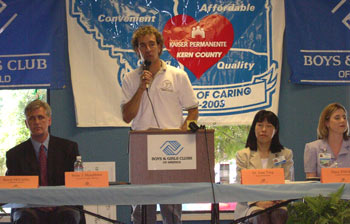| Ron Jones Bio |
| CorporateWellness |
| Coach & Train |
| Exercise Library |
| Handouts |
| Health & Fitness |
| KETTLEBELLS |
| Products by RJ |
| Site Map |
Grant to Aid Childhood Obesity Fight

Ron Jones at Boys & Girls
Club/Kaiser Permanente Press Conference with CA Assemblyman
Kevin McCarthy (R-Bakersfield)
announcing the new "Fit for Life" Obesity Prevention Program for community youth.
By SHELLIE
BRANCO, Californian staff writer
e-mail: sbranco@bakersfield.com
Monday July 21, 2003, 11:07:21 PM
With childhood obesity on the rise in Kern County, the Boys & Girls Club of Bakersfield is hoping to fight the condition and its effects on health with help from a $50,000 grant from Kaiser Permanente Kern County.
The grant comes from Kaiser's Community Service Grant Fund, which provides nearly $100,000 every year to nonprofit organizations providing health and human services in the county.
The grant, which will be presented Friday at the Boys & Girls Club, will fund staff training for a new component of the club's after-school program at Bakersfield schools that will identify children at risk for obesity and Type II diabetes, said Zane Smith, executive director of the Boys & Girls Club of Bakersfield.
Type II diabetes, associated with a high level of blood sugar in the body, was previously considered an adult disease, said Joan Ying, chief of pediatrics for Kaiser Permanente Kern County.
But doctors are seeing more cases of Type II in obese children and adolescents, she added.
The program aims to screen children at risk for the disease and teach them healthy lifestyle habits that will last, Smith said.
Three of the 10 elementary schools in the Bakersfield City School District at which the club offers after-school programs will offer the screening starting in September. The program will serve 200 children in the district.
Participating schools have not been chosen yet, but potential sites are Evergreen, College Heights and Colonel Howard Nichols, Smith said. The club will also host an in-house program, he added.
The program was six months in the making, but it isn't the first time the two organizations have partnered on the issue of children's fitness. Kaiser Permanente Kern County has funded the club's Fitness Authority program for four years, said Cristy Cortez-Sackrider, director of public affairs for Kaiser Permanente Kern County.
But the Fitness Authority program is designed to teach children fitness skills and didn't adequately address obesity, Smith said.
"Although they hang out and have a great time with us, when they're back at home they were laying around, doing couch potato stuff," Smith said.
In Kern County in 2001, 20.7 percent of children between the ages of 5 and 20 years in the Child Health and Disability Prevention program were reported as overweight or obese, according to the Pediatric Nutrition Surveillance System annual survey.
Although the number of children in the program represents only a portion of all children in the county, it's an alarming statistic that county health officials notice is rising, said Michelle Pearl-Krizo, coordinator for Child Health and Disability Prevention at the Kern County Department of Public Health.
Children from low-income backgrounds are often susceptible to poor nutritional choices at home, and subsequently, obesity, Smith said.
He said he's known of parents who can't make outings to the grocery store so they shop at nearby liquor stores, where healthy food choices are limited.
"One child said he gets cheese from Cheetos they buy from the local ampm store," Smith said.
The program's coordinators hope to reach parents through information the children bring home. To further involve parents, at the start of the program parents will be given a survey about their child's eating and lifestyle habits to assess the risk of childhood obesity.
The program will also hold a family night in December to show parents what children have learned about health and nutrition.
But they're hoping success will be measured from the children's enthusiastic sharing of what they've learned.
"Children can be some of the strongest advocates at home," Smith said.
Local fitness consultant Ron Jones will coordinate fitness plans for the club's staff to teach to the children, incorporating everyday, inexpensive activities like jumping rope and playing with a Frisbee as ways to stay in shape, Smith said.
The bulk of the program will focus on nutrition and controlling portion sizes, using the United States Department of Agriculture food pyramid as a guide, he added.
Ying attributes the rise in obesity to the lifestyles of working families. Working parents often find it easier to feed their families with fast food, which contributes to obesity, Ying said.
And children often get empty calories from sodas and sugary juice drinks, she added. Parents even start the problem early in a child's life by feeding them solid foods too early when they're babies, she said.
The signs of Type II diabetes, including thirst and frequent urination, can be subtle or unnoticeable, Ying said. Obesity is often a doctor's biggest clue to the disease, she said.
Though Type II diabetes can be genetic, diabetic parents may also increase the risk by transferring unhealthy eating habits to their children, Ying said.
"The most effective way to treat it is to prevent it," Ying said. "For the sake of the children, parents have to start healthy-eating habits early."
RonJones.Org | Back to Fit for Life | Site Map
(Updated 11.23.07)

